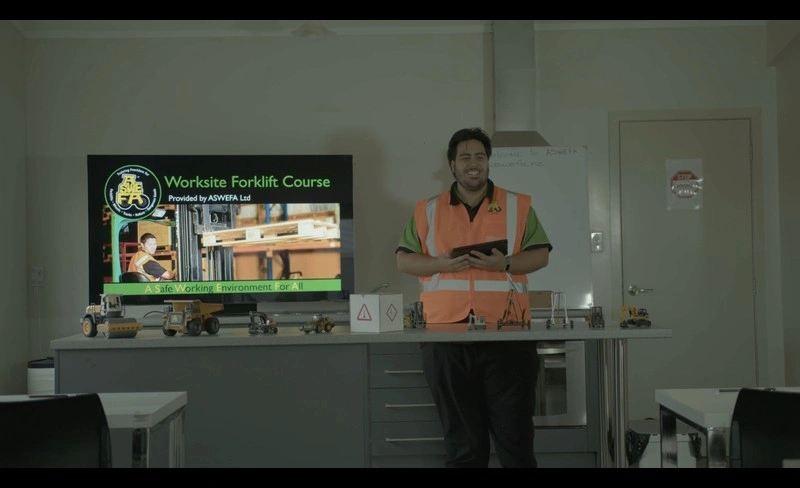Empowering Confidence and Safety Through Machinery Training


Between 2013 and 2020 WorkSafe recorded 11 fatalities involving a forklift and an average of 127 injuries resulting in more than a week away from work each year. Across industries, from logistics and warehousing to construction and manufacturing, machinery plays a vital role in keeping businesses efficient and productive. But beyond the convenience and power of machines like forklifts and elevating work platforms (EWPs) and Wheels, Tracks or Rollers (WTR), there lies a responsibility that no business can afford to overlook—ensuring the safety of the people who operate them.
At ASWEFA (A Safe Working Environment for All), we have spent over two decades focused on this exact mission: making sure people not only walk away with the skills to operate machinery but that they go home safe, confident, and proud of what they’ve achieved.
I’m Trysen Myers, the Manager of ASWEFA’s Hamilton Training Center. My journey in training began with a love for connecting with people and a lifelong exposure to machinery. It was a natural fit for me to move into a role where I could combine these passions. Every day, I see firsthand how proper training makes a difference—not just in terms of compliance and fiscally in the cost damages have on a company, but in the way it empowers individuals to feel confident and capable in their workplace.
At ASWEFA, we’ve developed a training culture that places a strong emphasis on personal achievement. It's a moment of pride to successfully complete a course and gain certification, and it’s important to acknowledge that. Whether participants are new to machinery or returning for a refresher course, I want every trainee to leave with a smile on their face and a real sense of accomplishment.
One experience that stands out to me happened early in my career at our West Auckland branch. A woman walked into the site, visibly nervous. When I asked how she was, she admitted she didn’t want to be there because of how anxious she felt about the training. I reassured her, saying all we could do was give it our best shot, and that’s exactly what she did. By the end of the day, she was driving the forklift confidently and was thrilled to have passed. Months later, I went to her workplace for more training, and she ran over to greet me, telling me how grateful she was for the support. She went on to learn the reach truck during that session and had even more confidence.
This is the kind of success that fuels my passion for this work. It’s about more than just passing a course; it’s about changing someone’s outlook and giving them the tools to succeed safely in their role.
The world of machinery and safety standards is constantly evolving, and staying on top of these changes is critical. I make it a priority to stay current with industry trends by talking directly to the people we train, conducting research online, and exploring new machinery and training techniques. But just as important as the technical side of things is how we approach the learning environment itself.
We live in a time where creating a safe, supportive space for learning is crucial. People need to feel comfortable asking questions, making mistakes, and improving without fear of judgment. I spend a lot of time listening to audiobooks and lectures on new teaching strategies and approaches to help people feel more at ease during training. My goal is always to bring out the best in everyone, making sure they leave not only with a certification but with confidence in their skills.
Safety Is a Shared Responsibility
One piece of advice I always share with businesses is that while new technology and safety features are fantastic, they’re only part of the equation. You can have the best machinery in the world, equipped with sensors, cameras, and warning devices, but if your safety culture isn’t the number one priority, you won’t reach your full safety potential.
Safety is a shared responsibility, and it’s something that needs to be embedded into the very fabric of the workplace. Everyone, from management to operators, plays a role in ensuring that the number one goal is for every person to go home in the same condition they came to work, or even better. Everything beyond that is a bonus.
At ASWEFA, we believe in creating a culture where safety isn’t just a checkbox to tick off but a mindset that’s ingrained in everything we do. No more “she’ll be right” attitudes. Let’s work together to make every workplace truly A Safe Working Environment For All (ASWEFA).
Interested in learning more about machinery training and how we can help your team stay safe and confident? You can find us online at aswefa.co.nz or reach out to us directly on 0800 ASWEFA or via email at sales@aswefa.co.nz.







